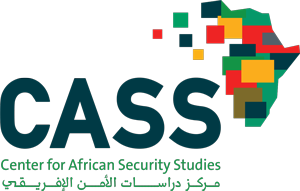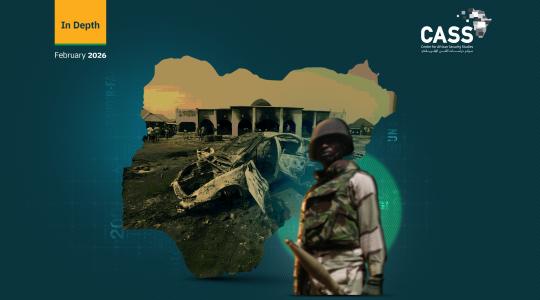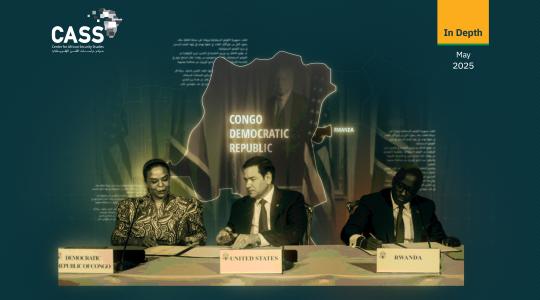For decades, Israel has shown a special interest in the Republic of Chad. There are compelling reasons for this, most notably the country’s strategic location in the heart of the African continent and on the edge of the Arab world, and the political links between Chad and other African states since its independence from France in 1960. It is therefore no surprise that Chad was one of the first sub-Saharan African countries in which Israel opened an embassy.
Early on, this relationship was accompanied by cooperation agreements in various fields, most notably a military deal under which Israeli officers and experts trained the Chadian army. Meanwhile, growing numbers of Israeli business executives visited Chad to invest and set up companies. However, all this was abruptly suspended in late 1972, when Chad announced it was cutting ties with Israel, following Arab and African pressure in solidarity with Egypt, Syria and Jordan after Israel’s victory and occupation of Arab lands in the Six Day War of 1967.
Relations remained severed for nearly 47 years. It was not until 2014 that officials from the two countries began visiting each other in private, with the aim of restoring their ties. This culminated in a visit by Chadian President Idriss Déby Itno to Israel in November 2018 and a reciprocal trip to Chad by Israeli Prime Minister Benjamin Netanyahu in January 2019. The two countries finally announced they were resuming diplomatic relations on January 20 of that year.
Déby’s killing in April 2021 cooled ties between Chad and Israel once again, but Israel’s Mossad intelligence agency took measures to prevent the relationship from collapsing. According to sources with knowledge of the matter, it used ties with military leaders and security and economic figures to organize meetings with the head of the Transitional Military Council, Déby’s son Mahamat Idriss Déby Itno. It finally convinced him to visit Tel Aviv in order to consolidate relations between the two parties. It was notable that he was accompanied by several security officials, including his brother and his right-hand man Abdelkerim, on a secret visit in May 2021.
Israel’s Motives
Israel’s rapprochement with Chad was preceded by its mending of ties with several countries in East and Central Africa, which it promoted under the slogan “Israel returns to Africa, Africa returns to Israel”.
Israel focused its efforts mainly on rapprochement with Muslim-majority countries such as Morocco to the West and Chad in the center, given their important strategic locations. Geographically, these countries provided Israel with gateways to penetrate Africa more deeply, especially in West Africa, where Chad had previously engaged in a counter-terror alliance with Niger, Mali, Burkina Faso and Mauritania. With the exception of Burkina Faso, none of these countries had diplomatic relations with Israel, so building a relationship with Chad facilitated Israeli efforts to achieve diplomatic breakthroughs and build long-term relationships.
One cannot ignore the economic factors in Israel’s efforts at rapprochement with Chad, as it seeks out new markets and bilateral economic cooperation, notably in trade and agriculture—particularly markets for Israeli expertise in developing agricultural technologies to make desert lands fertile.
In this a context, arms deals and counter-cooperation on counter-terrorism also constitute security and economic gains for Israel. The country wants to become a major arms supplier to Chad, which imports most of its weapons and military equipment from France and the United States. Moreover, Israel wants to open Chad’s airspace to Israeli aviation, slashing flight times between Tel Aviv and Latin America via a route also overpassing Sudan and Libya.
Indeed, the security dimension plays a major role in Israel’s relations with Chad in view of the latter’s military strength. Chad has one of the strongest armies in Central Africa, making a relationship with it a potential strategic asset to Israel. There have been repeated reports that both the former and current Chadian leadership—Déby senior and his son—sent military personnel overseas as mercenaries: to Mali in 2021-2023 at the request of France; to Libya in support of General Khalifa Haftar; and to Yemen in 2015 to support the United Arab Emirates and Saudi Arabia against the Houthi movement.
Thus, Israel could potentially request that Chadian personnel or pro-government mercenaries carry out special operations on its behalf, such as taking control of certain areas in the oil-rich south of Libya, where Chad’s forces fought against rebel groups previously.
Chad’s Motives and Potential Gains
The need for military support has been at the heart of successive Chadian governments’ motivations for improving their relations with Israel. Immediately after independence, President François Tombalbaye (r.1960-1975) sought relations with Israel in order to obtain its military backing against rebels in the north and center of Chad.
Despite the severance of diplomatic relations in the early 1970s, Israeli experts continued to train the Chadian army. Israel also continued to send clandestine shipments of weapons such as anti-tank missiles and various types of machine gun to Chad, as well as providing the country with military and security expertise to help it tackle jihadist groups around Lake Chad, along with armed groups that were based in southern Libya during the Gaddafi era and seek, to this day, to overthrow the Déby regime.
In this context, the complexity of the situation in Central Africa and the deployment of Russian forces there constitute new motivations for Chad to seek out the backing of a militarily and technologically strong international ally. N’Djamena has coordinated closely with the United Arab Emirates as it builds an alliance including Israel, as demonstrated by Chad’s normalization with Israel in early 2019 along with several Muslim-majority countries as part of a broad international coalition in which Israel plays a key role.
In addition to these motives, the economic dimension is of particular importance to Chad, which suffers from desertification and the loss of agricultural land, meaning it has much to gain from Israel’s technical and practical know-how in these areas, as well as Israel solar energy technologies.
Economic activity by Israeli companies is also likely to bear major financial fruit for the Chadian junta’s president, whether in the fields of oil and gas exploration or mining of uranium in the country’s north. It is likely that Chad also wants to capitalize on ties with Israel to procure modern equipment and weapons for its army, especially as it battles rebels on several fronts domestically.




